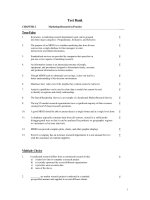Lecture Marketing research (12th edition) - Chapter 24: Brand and customer metrics
Bạn đang xem bản rút gọn của tài liệu. Xem và tải ngay bản đầy đủ của tài liệu tại đây (689.71 KB, 15 trang )
1
Marketing Research
Aaker, Kumar,
Leone and Day
Twelfth Edition
Instructor’s
2
Chapter Twentyfour
Brand And Customer Metrics
Marketing Research 12th Edition
3
Competitive Advantage
Michael Porter’s Five Forces Model
Source: />Marketing Research 12th Edition
Assessing Competitive Advantage
MarketBased Assessment
Marketbased
Processbased
Market share
Marketing skills audit
Recall share
Comparison of relative costs
Advertising share
Comparison of winning versus losing competitors
R&D share
Identifying highleverage phenomena
4
Marketing Research 12th Edition
Assessing Competitive Advantage
ProcessBased Assessment
5
Marketing Research 12th Edition
6
Brand Equity
•
•
Defined as a set of brand assets and liabilities linked to a
brand, that add to or subtract from the value of a product
or service to a company and/or its customers
The Assets can be grouped as
1.
Brand Loyalty
2.
Name Awareness
3.
Perceived Quality
4.
Brand Associations in addition to perceived quality
5.
Other Proprietary Brand Assets: patents, trademarks, channel
relationships, etc.
Marketing Research 12th Edition
7
Brand Equity (Contd.)
Brand equity.
SOURCE: David A. Aaker, Managing Brand Equity. New York: The Free Press, 1994.
Marketing Research 12th Edition
8
Measuring Brand Equity
1.
2.
3.
4.
5.
ExcessPrice Approach
Observation
Customer Research
Tradeoff Analysis
Impact on Customer Evaluation
Marketing Research 12th Edition
9
Measuring Brand Equity (Contd.)
6.
7.
8.
9.
10.
Replacement Cost Approach
Stock Price Approach
Future Earnings Approach
Discounting the future profit stream
Applying an earnings multiplier
Marketing Research 12th Edition
10
Customer Satisfaction Research
•
•
Customer satisfaction research should be done at planned
intervals so as to track satisfaction over time
Measurement Process
▫
Define goals and specify how information will be used
▫
Discover what is important to customers and employees
▫
Measure critical needs
▫
Act on the information
▫
Measure performance over time
Marketing Research 12th Edition
11
Contemporary Applications of Marketing
Intelligence
What Is BuyerCentricity?
•
•
•
•
Provide services that help customers make informed decisions
on buying better and cheaper products more easily
Help buyers to buy rather than help sellers to sell
Help consumers maximize the efficiency, productivity, and
marketable value of personal assets as money, time,
information, attention and emotional commitment
Present offerings relevant to the buyer’s unique individual
characteristics and that recognize what customers currently
seek to achieve
Marketing Research 12th Edition
12
Who Gains from BuyerCentricity?
In contrast to popular perceptions, buyercentricity aids not only
consumers but also sellers.
The advantages stem from a range of sources mentioned
below:
•
Growth Markets
•
Beyond Revenue Implications
•
Fewer Bucks for More Bang
•
Trust
Marketing Research 12th Edition
13
Maximizing Customer Profitability
Marketing Research 12th Edition
14
Maximizing Customer Profitability (Contd.)
CLV maximization cycle is comprised of the following
steps:
1.
2.
3.
4.
5.
Customer Selection
Managing Loyalty and
Profitability Simultaneously
Optimal Allocation of
Resources
Pitching the Right Product to
the Right Customer at the
Right Time
Preventing Customer Attrition
6.
7.
8.
9.
10.
Managing MultiLevel
Shoppers
Linking Investment in Branding
to Customer Profitability.
Acquiring Profitable Customers
Referral Marketing Strategy.
The Future of Customer
Management
Marketing Research 12th Edition
15
End of Chapter Twentyfour
Marketing Research 12th Edition









